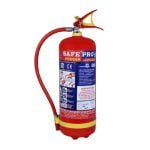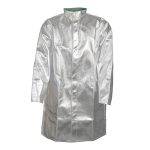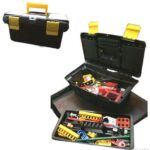Your list is empty, add products to the list to send a request
Which Smoke Detector Sensor is Better?

12
May
Fire safety is a critical consideration for any building, whether residential or commercial. Among the most vital components of fire safety systems are smoke detectors. A reliable smoke detector can save lives by alerting occupants to the presence of smoke or fire, giving them time to evacuate. But with so many different types of smoke detectors available, how do you determine which sensor is best for your needs?
In this blog, we will explore the various types of smoke detector sensors available, compare their features and benefits, and help you choose the best one for your fire safety system. At Firesupplies, we are dedicated to offering high-quality fire safety products, such as fire alarm systems, gas detection systems, emergency lighting, and fire safety gear. Let’s dive into the different types of smoke detector sensors and their applications.
Understanding Smoke Detectors and Their Importance
Smoke detectors play a crucial role in building and human safety by detecting smoke and providing early warning of potential fire hazards. These devices are equipped with sensors that react to specific environmental factors, such as smoke or heat. The primary function of a smoke detector is to sound an alarm when smoke is detected, allowing people to take necessary precautions before the fire escalates.
At Firesupplies, we offer a range of high-quality smoke detectors, including the Honeywell Multi-Sensor Smoke Detector. With our extensive selection of fire safety products, we ensure that you have access to the best solutions available in India.
Types of Smoke Detector Sensors
Smoke detectors generally operate using one of the following types of sensors:
1. Ionization Smoke Detectors
Ionization smoke detectors are one of the most commonly used types. These detectors rely on a small amount of radioactive material to ionize the air inside the detector. When smoke enters the detector, it disrupts the ionization process, triggering the alarm.
Advantages:
- Fast detection of fast-flaming fires
- Widely available and affordable
Disadvantages:
- Sensitive to certain gases, which may cause false alarms
- Less effective at detecting slow-burning fires
2. Photoelectric Smoke Detectors
Photoelectric smoke detectors use a light source and a light sensor to detect smoke. When smoke particles enter the detector, they scatter the light, triggering the sensor and activating the alarm.
Advantages:
- Better at detecting slow-smoldering fires
- Fewer false alarms compared to ionization detectors
Disadvantages:
- Slower response to fast-flaming fires
- Can be affected by dust and dirt accumulation
3. Multi-Sensor Smoke Detectors
Multi-sensor smoke detectors, like the Honeywell Multi-Sensor Smoke Detector, combine both ionization and photoelectric technologies to improve detection accuracy. These sensors detect a wider range of fire hazards, from fast-flaming fires to slow-smoldering ones, providing comprehensive protection.
Advantages:
- Provides a higher level of accuracy and reliability
- Reduced risk of false alarms
- Detects a wide range of fire types
Disadvantages:
- Generally more expensive than single-sensor detectors
- More complex to install
4. Heat Detectors
While not strictly a type of smoke detector, heat detectors are sometimes used in conjunction with smoke detectors for added protection. These detectors are activated when a set temperature is exceeded or when there is a rapid increase in temperature.
Advantages:
- Useful in environments with a lot of dust or smoke
- Less prone to false alarms
Disadvantages:
- May not detect fires that are smoldering or low in heat
- Less sensitive than smoke detectors
5. Aspirating Smoke Detectors (ASDs)
Aspirating smoke detectors, also known as air-sampling smoke detectors, continuously draw air into a detector unit, where smoke is detected by a laser or light scattering sensor. This type of detector provides early detection and is often used in areas that require high levels of protection, such as data centers or clean rooms.
Advantages:
- Highly sensitive and early warning
- Can cover large areas with a few detectors
Disadvantages:
- Expensive
- Requires regular maintenance and calibration
Key Features to Consider When Choosing a Smoke Detector Sensor
When selecting a smoke detector sensor for your home or business, several factors should influence your decision:
Sensitivity
The sensitivity of the smoke detector sensor is essential in determining how quickly it will react to smoke or fire. Multi-sensor detectors offer better sensitivity across different fire scenarios, providing more reliable early warnings.
False Alarms
One of the challenges with smoke detectors is the potential for false alarms, particularly in ionization detectors. Photoelectric and multi-sensor detectors are often less prone to false alarms.
Cost
Cost is a crucial factor when choosing a smoke detector. While multi-sensor detectors are more expensive, their added protection and reliability can justify the investment. Single-sensor detectors are more affordable but may not offer as comprehensive protection.
Installation and Maintenance
Ease of installation and maintenance is another factor to consider. Some detectors, like aspirating smoke detectors, require professional installation and regular maintenance, while others can be easily installed by homeowners.
Why Choose Firesupplies for Your Smoke Detector Needs?
At Firesupplies, we are proud to offer high-quality fire safety products, including Honeywell Multi-Sensor Smoke Detectors and other reliable fire alarm systems. We provide a wide selection of smoke detectors designed to meet the diverse needs of our customers, ensuring that your building is well-protected.
Our commitment to offering affordable prices, a vast product selection, and exceptional customer service has made us a trusted name in the fire safety industry. Whether you are looking for smoke detectors for your home or business, Firesupplies has the products and expertise to help.
Explore Our Smoke Detector Range:
Check out the Honeywell Multi-Sensor Smoke Detector on our website to find out more about its features and how it can enhance your fire safety system.
Frequently Asked Questions (FAQs)
1. What is the most commonly used smoke detector?
A: The most commonly used smoke detectors are ionization smoke detectors. These detectors are affordable and responsive to fast-flaming fires, making them a popular choice for residential and commercial buildings. However, they may not perform as well with slow-burning fires.
2. Which sensor is best for fire detection?
A: The best sensor for fire detection depends on the type of fire you are trying to detect. For most environments, a multi-sensor smoke detector offers the best protection, as it combines both ionization and photoelectric sensors to detect a wide range of fires. If you’re looking for the best of both worlds, a multi-sensor detector like the Honeywell Multi-Sensor Smoke Detector is highly recommended.
3. Which type of sensor is used in a smoke detector?
A: The most common types of sensors used in smoke detectors are ionization, photoelectric, and multi-sensor technologies. Ionization sensors detect fast-flaming fires, while photoelectric sensors are more effective for slow-burning fires. Multi-sensor detectors combine both technologies to offer better overall performance.
Conclusion
When it comes to fire safety, choosing the right smoke detector sensor is essential to ensure early warning and maximum protection. Whether you choose a photoelectric, ionization, or multi-sensor smoke detector, Firesupplies has the products and expertise to provide you with top-notch fire safety solutions. Explore our range today and ensure the safety of your building and its occupants.
Visit Firesupplies to browse our full range of fire safety products and make an informed choice about your smoke detector needs.



























